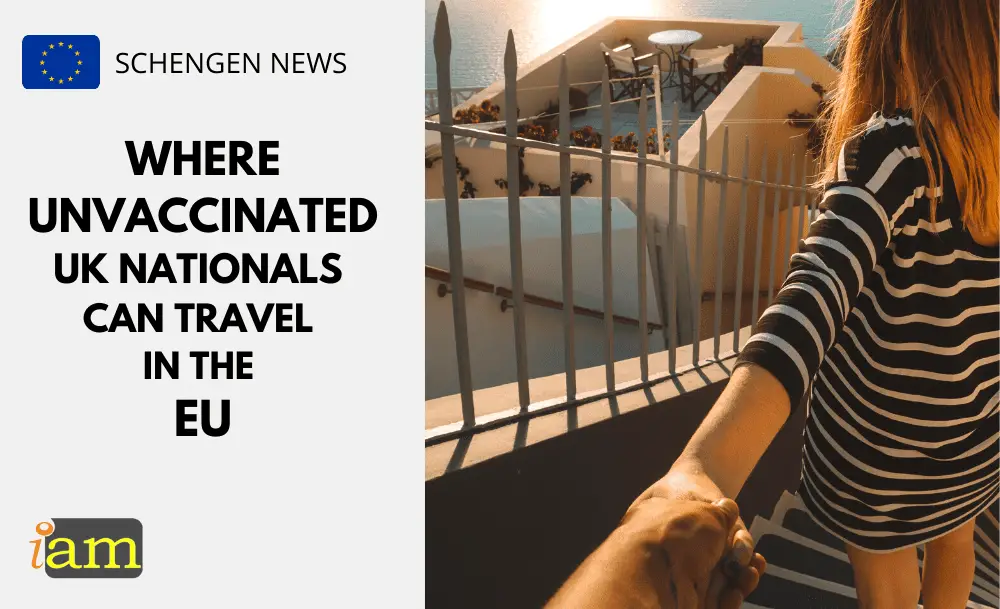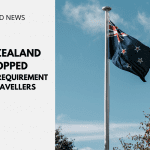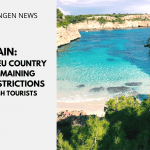Where Unvaccinated UK Holidaymakers Can Travel in the EU

Proof of vaccination status against Covid-19 has become a standard entry requirement for most countries across the world as part of ongoing restrictions.
Many destinations are only allowing travellers who are double jabbed against coronavirus to enter, and it is expected that a booster dose could become a requirement in the future.
More than 84% of people over the age of 12 in the UK have now had two doses of a Covid-19 vaccine, according to government data, but there are still many who have not yet taken up the offer of a vaccine at all.
Despite Covid travel rules still being in force in most countries across the world such as Spain or France requiring British holidaymakers to be fully vaccinated, some destinations have not yet made it mandatory for visitors to show proof of vaccination to enter.
Instead, travellers only need to show a recent negative test or a certificate of coronavirus recovery.
Here are 7 places you can travel to if you or one of your party hasn't had the jab or isn't fully vaccinated.
Croatia
Croatia offers a number of options. To enter Croatia, unvaccinated UK visitors present any of the following:
- Negative PCR test 72 hours before prior to departure
- Negative antigen test 24 hours before arrival
- A certificate showing that they have recovered from Covid-19 and have received one dose of an approved EU vaccine,
- A positive PCR or antigen test taken in the previous 180 days and is older than 11 days
- Take a PCR or antigen test immediately upon arrival and self isolate until they receive the results, with a seven-day confinement if it's positive.
For more information when travelling to Croatia, check out the official website.
Cyprus
The UK is currently in Cyprus’ Red category, meaning restrictions are a bit heavier than in other countries. However, people who are unvaccinated can still visit.
Unvaccinated British travellers to Cyprus must present a negative PCR taken 72 hours before departure, or an antigen taken 24 hours before departure. All travellers must complete a Cyprus Flight Pass before arrival.
Upon arrival, all passengers above the age of 12 must take a PCR test at the airport, and self-isolate in their accommodation until the results are available.
If travellers produce a positive test result, a follow-up PCR is required and authorities should be notified. The self-isolation period is 14 days for those who tested positive.
Greece
Unvaccinated travellers can enter Greece providing they can:
- Show proof of a negative PCR test taken within 72 hours before arrival
- Show proof of a negative rapid antigen test from an authorised laboratory taken within 24 hours before arrival
Authorities will randomly select travellers and will be subject to mandatory rapid testing upon arrival. Those who test positive must quarantine for 5 days if they have no fever. Otherwise, they must remain in isolation until they have no fever. Quarantine is lifted when isolated travellers provide a negative PCR test.
To get the latest travel news, check the Greek website.
Ireland
To enter Ireland, unvaccinated visitors will need to present any of the following:
- Proof of a negative PCR test taken no more than 72 hours before entry
- Proof of recovery from COVID-19 in the past six months.
- A positive PCR test result from a test taken no less than 11 days and no more than 180 days prior to the date of arrival in Ireland
Check out more details at the Irish government website.
Italy
The UK is on Italy's D list, which means that passengers aged six years and older have to show a negative PCR test taken 48 hours prior to entry, or a negative antigen test 24 hours prior to entry.
They must then inform the local health authority of their entry to Italy, travel to their final destination by private transport, self isolate for five days, and take a PCR or antigen test at the end of the isolation period.
Portugal
Unvaccinated visitors must provide a negative PCR test taken 72 hours before landing, or a negative antigen test taken 24 hours before landing.
Check out more details at the government website.
Slovenia
Visitors to Slovenia must provide either a PCR test no older than 48 hours, an antigen test no older than 24 hours, or a positive PCR test that is older than ten days but not older than six months.
Failing that, visitors can choose to quarantine for seven days, if they have proof that they have accommodation. Quarantine ends when they can provide a negative PCR test from the fifth day of home quarantine.
Return to the UK
From 11 February, there’s one fewer test for unvaccinated or partly vaccinated travellers entering the UK.
Unvaccinated people have to take a lateral flow or PCR test within the two days prior to travel to the UK and take a PCR test upon arrival to the UK within the first two days upon arrival.
Travel rules in the UK can change at short notice. However, ministers have mentioned “learning to live with Covid-19” amid the current relaxation of rules, including the end of the “Plan B” guidance given during winter.
It is therefore recommended to keep up with the UK's travel rules.
Do you need to renew your passport? Talk to us in the comment section below. Or if you need more advice on the above, contact us for further travel & immigration advice.
Check out the deals we have found below and tell us your travel plans.
Check out the offers and discounts from:
And because of the pandemic, don’t forget to get your travel insurance, which will cover you for flight disruptions and pandemic related matters.
IaM can help with your visa application to Europe, the United States, the UK & other countries
If you need help with a US visa, a UK Visa, or a visa to Europe, including help with appointment booking obligations, IaM can help. For more information and advice on US immigration, UK immigration law and US visa applications or if you need any help or assistance please, reach out to your Visa Coordinator at IaM.
Some of our posts include affiliate links. If you choose to purchase any of these products, we might get a small commission. For more information, check out our TOS.











